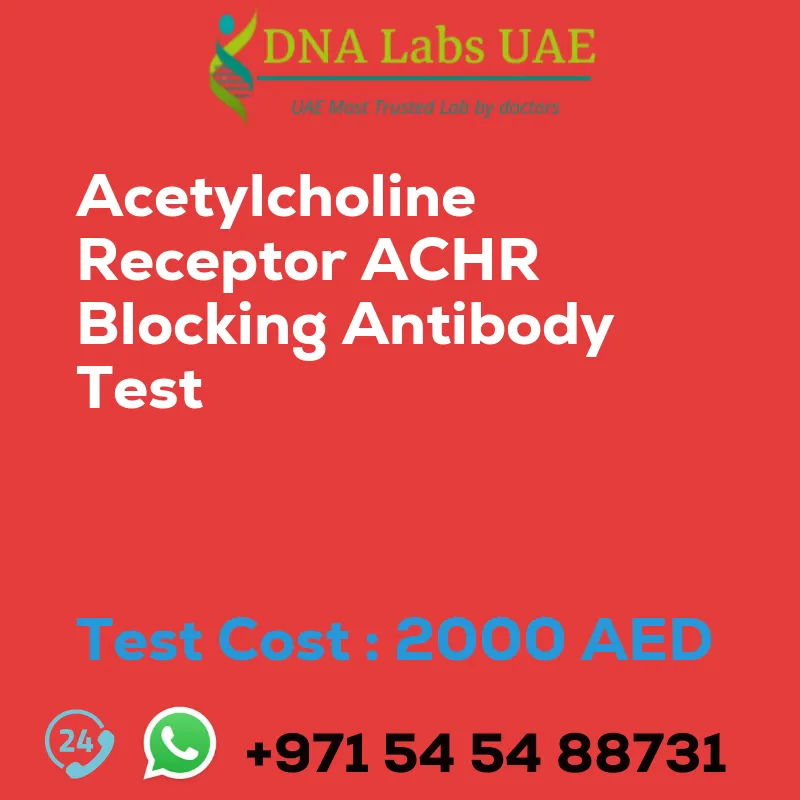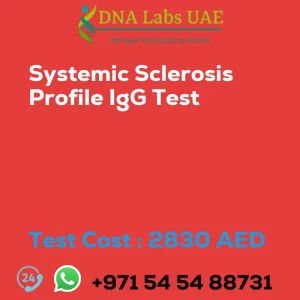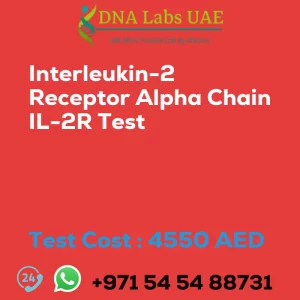ACETYLCHOLINE RECEPTOR ACHR BLOCKING ANTIBODY Test
Cost: AED 2000.0
Symptoms, Diagnosis, and Test Details:
The ACETYLCHOLINE RECEPTOR ACHR BLOCKING ANTIBODY test is a laboratory test used to detect the presence of antibodies that block acetylcholine receptors (AChR) in the body. These antibodies are typically found in individuals with autoimmune conditions such as myasthenia gravis (MG). Myasthenia gravis is a neuromuscular disorder characterized by muscle weakness and fatigue.
It occurs when the immune system mistakenly attacks AChR, which are proteins located on the surface of muscle cells. Antibodies that block AChR can interfere with the normal transmission of nerve signals to the muscles, leading to muscle weakness.
The ACETYLCHOLINE RECEPTOR ACHR BLOCKING ANTIBODY test involves collecting a blood sample from the individual and testing it for the presence of these antibodies. The test is typically performed using a technique called radioimmunoassay or enzyme-linked immunosorbent assay (ELISA). These tests can detect and measure the levels of AChR blocking antibodies in the blood.
A positive result on the ACETYLCHOLINE RECEPTOR ACHR BLOCKING ANTIBODY test indicates the presence of these antibodies and suggests a diagnosis of myasthenia gravis. However, it is important to note that not all individuals with myasthenia gravis will test positive for AChR blocking antibodies. In some cases, other antibodies, such as anti-MuSK antibodies, may be responsible for the condition.
The ACETYLCHOLINE RECEPTOR ACHR BLOCKING ANTIBODY test is often used in conjunction with other diagnostic tests, such as electromyography (EMG) and a physical examination, to confirm a diagnosis of myasthenia gravis. It can also be used to monitor the effectiveness of treatment and assess disease progression.
Overall, the ACETYLCHOLINE RECEPTOR ACHR BLOCKING ANTIBODY test plays a crucial role in the diagnosis and management of myasthenia gravis, helping healthcare professionals make informed treatment decisions for individuals with this condition.
For more information or to schedule a test, please contact DNA Labs UAE.
| Test Name | ACETYLCHOLINE RECEPTOR ACHR BLOCKING ANTIBODY Test |
|---|---|
| Components | |
| Price | 2000.0 AED |
| Sample Condition | 2 mL (0.5 mL min.) serum from 1 Red Top (No Additive) tube. Do not use SST gel barrier tubes. Ship refrigerated or frozen. Duly filled Test Send Out Consent Formis mandatory. |
| Report Delivery | 2-3 weeks |
| Method | Radioimmunoassay |
| Test type | Myasthenia Gravis |
| Doctor | Physician, Neurologist |
| Test Department: | OS |
| Pre Test Information | Duly filled Test Send Out Consent Formis mandatory. |
| Test Details |
The AChR blocking antibody test is a laboratory test used to detect the presence of antibodies that block acetylcholine receptors (AChR) in the body. These antibodies are typically found in individuals with autoimmune conditions such as myasthenia gravis (MG). Myasthenia gravis is a neuromuscular disorder characterized by muscle weakness and fatigue. It occurs when the immune system mistakenly attacks AChR, which are proteins located on the surface of muscle cells. Antibodies that block AChR can interfere with the normal transmission of nerve signals to the muscles, leading to muscle weakness. The AChR blocking antibody test involves collecting a blood sample from the individual and testing it for the presence of these antibodies. The test is typically performed using a technique called radioimmunoassay or enzyme-linked immunosorbent assay (ELISA). These tests can detect and measure the levels of AChR blocking antibodies in the blood. A positive result on the AChR blocking antibody test indicates the presence of these antibodies and suggests a diagnosis of myasthenia gravis. However, it is important to note that not all individuals with myasthenia gravis will test positive for AChR blocking antibodies. In some cases, other antibodies, such as anti-MuSK antibodies, may be responsible for the condition. The AChR blocking antibody test is often used in conjunction with other diagnostic tests, such as electromyography (EMG) and a physical examination, to confirm a diagnosis of myasthenia gravis. It can also be used to monitor the effectiveness of treatment and assess disease progression. Overall, the AChR blocking antibody test plays a crucial role in the diagnosis and management of myasthenia gravis, helping healthcare professionals make informed treatment decisions for individuals with this condition. |








